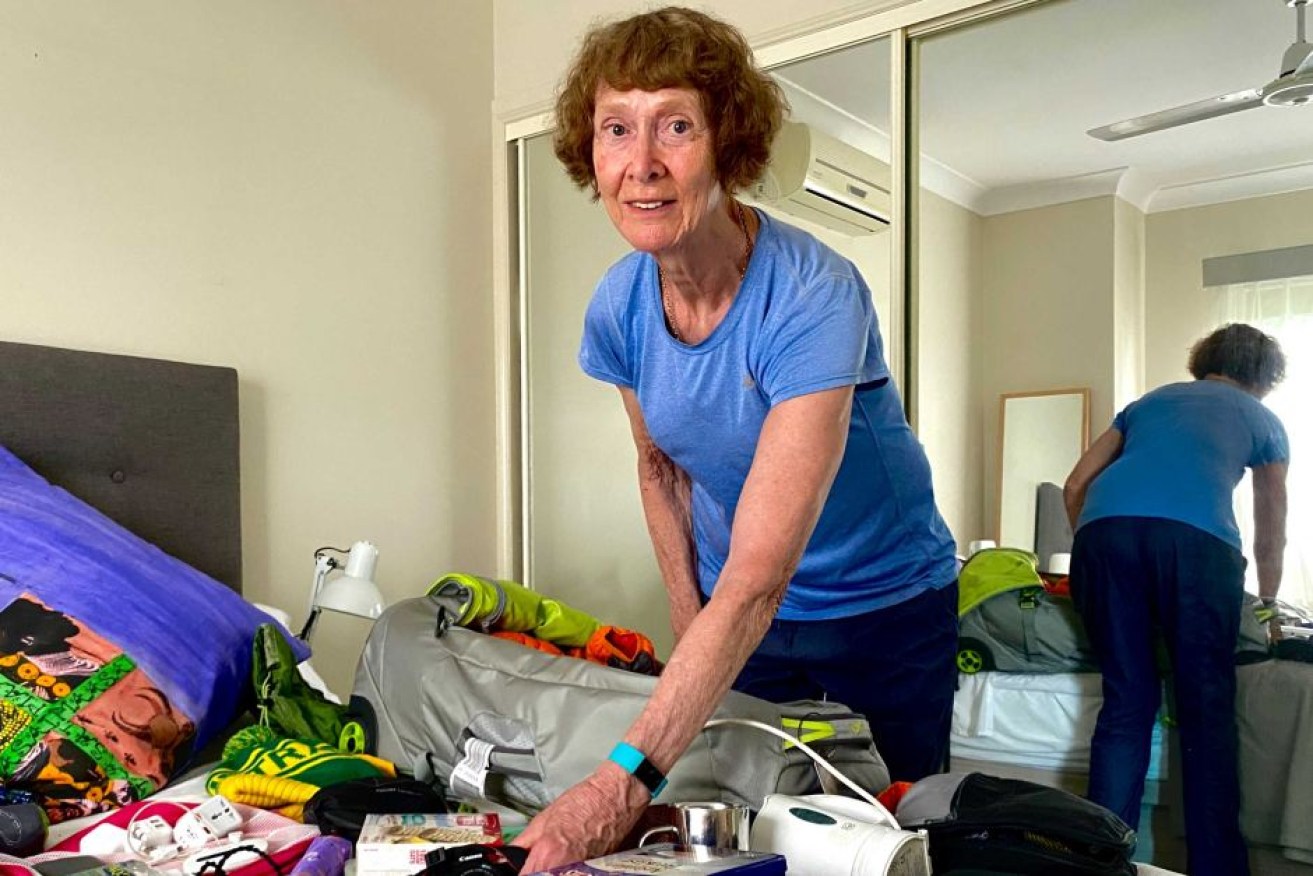COVID-19 is being called a pandemic by insurers, making travel insurance policies void

Gwen Davis-Goff still wants to see the world, despite the threat posed by coronavirus. Photo: ABC News/Steve Keen
Gwen Davis-Goff is such a thrifty traveller, she packs a kettle in her suitcase so she does not have to pay for cups of tea.
But thanks to coronavirus, her upcoming overseas holiday has become far more expensive than she expected.
The 71-year-old has been careful to purchase insurance that would cover her medical costs, should she contract the virus – particularly given she plans to visit the US, where hospital bills can be high.
As a result, she has taken out not one insurance policy, but four.
“I’ve had to re-examine it [the trip] really carefully, and make sure there’s lots of flexibility in it,” she said.
“Together, all of these policies have cost me about $2000.”
‘I’m feeling very let down’
Initially, Ms Davis-Goff got travel insurance when she used her Bankwest credit card to book the holiday – but she found in the product disclosure statement that she was not covered for infectious disease.
So, she then purchased Woolworths Insurance.
But after she bought that policy, Woolworths’ underwriters defined the coronavirus outbreak as a pandemic.
She discovered epidemic and pandemic-related costs were excluded from the policy, even if the policy was taken out before a pandemic was declared.

At 71, Gwen knows the importance of insurance coverage for medical costs. Photo: ABC News/Steve Keen
Determined to be covered for her trip, she next bought a policy with Budget Direct.
But she lost confidence in its coverage after multiple conversations with the company.
“They had provided [advice] to me twice in writing and twice verbally on the phone,” Ms Davis-Goff said.
But when I really pushed them, they said, ‘You may not be covered’.’’
Later, the company formally confirmed she would be covered — but by that point, she had already purchased a fourth policy, with US insurer Seven Corners.
She had been especially concerned about coverage for medical costs in the US, where healthcare is prohibitively expensive.
“I’m feeling very let down by the insurers,” she said.
“I think they should have been telling me what was happening and that I was possibly not covered.”

Ms Davis-Goff loves to travel, and has even made it as far as Antarctica.
Insurers set own cut-off dates
Consumer group Choice says Ms Davis-Goff’s experience is likely to be shared by other frustrated travellers.
“Insurance is there to guard against future unknown events,” Choice’s Jodi Bird said.
“When something like [coronavirus] becomes known, the insurers cut off cover.”
When it comes to events like the coronavirus outbreak, insurance companies set their own cut-off dates.
Customers who purchase a policy after the cut-off date will not be covered.
For this outbreak, those cut-off dates generally fall around January 23, when the World Health Organisation confirmed almost 600 cases of the virus across several countries.
Other policies exclude pandemics and infectious diseases completely, regardless of when the policies are bought.

Choice’s Jodi Bird says many travellers are shocked to discover the limits on their insurance cover. Photo: ABC News/Billy Cooper
Mr Bird said many travellers were both surprised and disappointed to find their insurance policy did not protect them from coronavirus-related costs.
“A lot of people, especially people who bought a travel insurance policy before the coronavirus became a known event, expect that they will be covered for medical expenses and cancellation expenses for coronavirus,” he said.
The Insurance Council of Australia says the only way to be assured of coverage for cancelling a trip, regardless of the reason, was to purchase a new and more expensive add-on product, called “cancel-for-any-reason” insurance.
“If you do get the jitters or you do feel uncertain about travelling in the future, you can cancel for any reason and you receive a percentage of your costs back,” the council’s Lisa Kable said.
“If you’re cancelling just because you’re feeling unsure or fearful or have cold feet, the standard cancellation policy doesn’t cover those feelings.”
Lucky couple recoups costs
One couple from Sydney was lucky enough to get all of their costs back, but this was not thanks to their insurance.
Shane Forrest and his wife Jane had planned to go to Vietnam and Japan in two weeks.
But they decided to cancel when they couldn’t get a straight answer from their insurer on whether they were covered for medical costs.
“It just so happened that the travel insurance we got has clauses in it that are so easily interpreted by them in their favour,” Mr Forrest said.
They did not expect to get a refund on their airfares, which cost $900.
But then their airline called to say their flight had been postponed by 24 hours.
When they declined the later flight, they were told all of their money would be refunded.
“I consider we are very lucky, but I am sure there are a lot of people out there who wouldn’t be nearly as lucky,” Mr Forrest said.
“I really think if travel insurance is going to be offered, and something pops up, that you should have some confidence that they are going to cover you.”
–ABC








